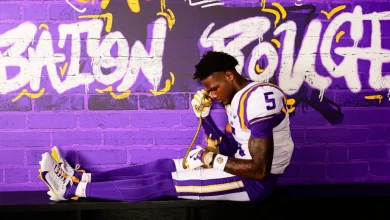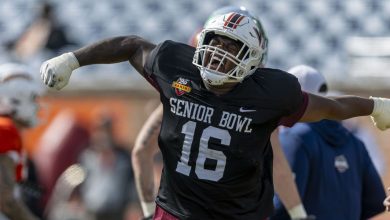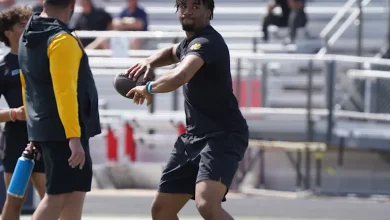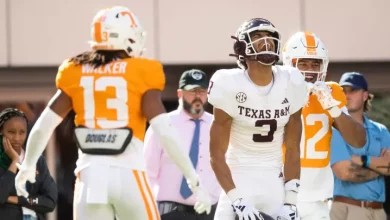Kirk Herbstreit defends Nico lamaleava in wakes of QB”s transfer portal departure from Tenessee.
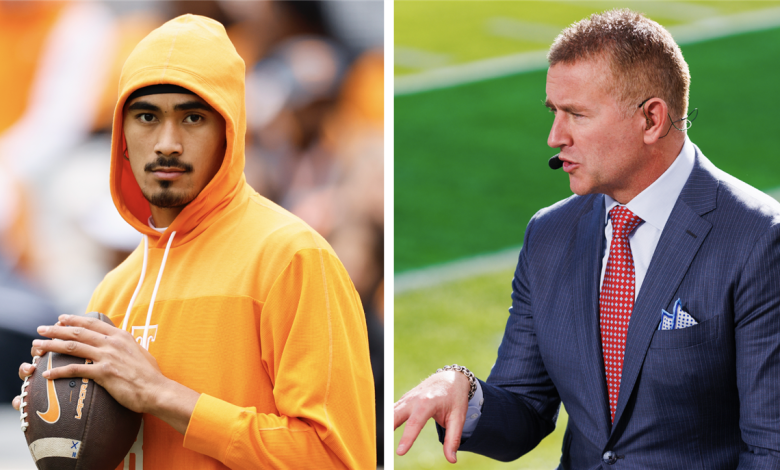
In the ever-evolving landscape of college football, where player movements, NIL deals, and the transfer portal dominate discussions, Nico Iamaleava’s recent decision to enter the transfer portal has left fans, analysts, and coaches scratching their heads. Iamaleava, a young and talented quarterback who made significant strides at the University of Tennessee, has found himself at the center of controversy after his decision to leave the Volunteers and pursue opportunities elsewhere. While many have questioned his motivations, including his rumored dissatisfaction with his current situation and NIL negotiations, ESPN’s Kirk Herbstreit has come forward to defend the quarterback, offering an insightful perspective on the challenges young players face in today’s college football environment.
The Rise of Nico Iamaleava: A Glimpse into His Potential
Before diving into the debate surrounding his departure from Tennessee, it’s important to recognize the remarkable potential Nico Iamaleava holds. The 6-foot-5, 220-pound quarterback from Long Beach, California, was one of the most highly touted recruits in the country when he committed to Tennessee in 2023. Iamaleava’s physical attributes, combined with his strong arm and football IQ, made him a natural candidate to lead a high-powered offense. Despite initially serving as a backup in his freshman year, he quickly gained the trust of coaches and teammates.
By his second season, Iamaleava had become the starter for Tennessee. His performances during the 2024 season were nothing short of impressive. Leading the Volunteers to a 10-3 record and a College Football Playoff berth, Iamaleava threw for over 2,600 yards, recording 19 touchdowns against just five interceptions. His poise in the pocket and ability to make clutch plays in critical moments were reminiscent of some of college football’s greatest quarterbacks, and his future seemed bright.
However, despite his on-field success, the off-field dynamics began to complicate things. This complexity intensified with the rise of NIL (name, image, and likeness) deals and the ongoing pressure on college athletes to maximize their earning potential.
The Role of NIL and Its Impact on College Athletics
In recent years, NIL deals have revolutionized the college sports landscape, allowing athletes to profit from their names, images, and likenesses. This shift has transformed college football from an amateur sport into a commercialized, high-stakes environment. Players, particularly those in high-profile positions like quarterback, have the opportunity to sign lucrative sponsorships, endorsement deals, and even launch their own personal brands.
While the introduction of NIL has undoubtedly benefited players, it has also led to some unintended consequences. The amount of money available to top recruits and established players has put additional pressure on athletes to perform, and in some cases, these financial considerations have complicated relationships between players, coaches, and programs.
In the case of Nico Iamaleava, reports suggest that his dissatisfaction with his current NIL situation played a significant role in his decision to enter the transfer portal. Iamaleava reportedly sought an increase in his NIL compensation, aiming to capitalize on his status as one of college football’s most promising quarterbacks. However, the University of Tennessee, a program with its own financial constraints and priorities, was reportedly unwilling to meet his demands.
This situation underscores the growing influence of NIL deals in college football, where players are now negotiating their worth with universities, boosters, and even third-party companies. As more athletes enter the transfer portal and seek better financial opportunities, the entire structure of college athletics continues to shift.
Kirk Herbstreit’s Defense of Nico Iamaleava
Kirk Herbstreit, a former quarterback at Ohio State and a well-respected voice in college football broadcasting, has long been an advocate for players navigating the complexities of college athletics. He has used his platform to offer thoughtful commentary on the changing dynamics of the sport, particularly in regard to NIL and the transfer portal.
When Iamaleava’s decision to enter the transfer portal became public, Herbstreit was quick to defend the young quarterback. In a series of interviews, Herbstreit emphasized that Iamaleava’s decision should not be judged solely through the lens of money or discontentment but rather as a product of the evolving landscape of college football.
1. Understanding the Pressures of NIL Deals
Herbstreit pointed out that the rise of NIL deals has created a new layer of complexity for college athletes, particularly those who are highly sought after like Iamaleava. He acknowledged that while NIL deals have provided players with new opportunities to capitalize on their talent, they have also introduced an unprecedented level of pressure. For someone like Iamaleava, who was already under the microscope as a high-profile recruit and starting quarterback, balancing on-field expectations with off-field financial considerations can be overwhelming.
“These players are navigating a minefield,” Herbstreit said. “On one hand, you have the opportunity to make a lot of money, and on the other, you’re being asked to perform at an elite level. It’s not just about football anymore – it’s about creating your brand, managing your deals, and dealing with the scrutiny of the media and fans.”
Herbstreit emphasized that Iamaleava’s decision to leave Tennessee could be driven by a variety of factors, including his desire to play for a program that would offer more financial opportunities or a more favorable environment for his personal growth and development. He reminded fans and analysts that athletes are still young people facing a myriad of challenges, and their decisions should be understood in the context of those pressures.
2. The Transfer Portal and Player Mobility
The advent of the transfer portal has further complicated the situation. The portal, which allows players to transfer between programs without sitting out a year, has become a significant factor in the recruitment and movement of college athletes. For players like Iamaleava, who are looking for the best possible fit, both on and off the field, the transfer portal offers an unprecedented level of mobility.
While many have criticized the transfer portal for fostering a “wild west” mentality in college football, Herbstreit defended the players who use it as a tool for bettering their careers. “The transfer portal isn’t just about leaving because of dissatisfaction; it’s about finding a place where you can thrive,” Herbstreit said. “For some players, that may mean a better coaching situation, better teammates, or yes, even a better NIL deal.”
Herbstreit acknowledged that Iamaleava’s decision to leave Tennessee could have been driven by a combination of factors, including his own growth as a player and a desire for a more financially favorable situation. But, Herbstreit reminded audiences, this is part of a larger trend in college football that’s driven by player empowerment. Just as coaches and programs have the right to move freely, so too should players be able to make decisions that benefit their careers.
3. A System in Need of Reform
One of Herbstreit’s central points was that the current state of college football, especially with the rise of NIL deals and the transfer portal, is in need of reform. He argued that while the NCAA’s original intent with NIL was to help players profit from their image and likeness, it has created an environment where financial incentives sometimes overshadow the traditional values of the sport, such as loyalty to a team or a commitment to a program.
Herbstreit suggested that the NCAA and college football administrators must take a hard look at how NIL is being implemented and consider reforms that ensure fairness, transparency, and balance. “We need to find a way to keep the integrity of the sport intact while giving players the ability to capitalize on their talents,” he said. “But we also need to create a system that isn’t just about the highest bidder.”
4. The Human Element
Beyond the financial and strategic aspects of Iamaleava’s decision, Herbstreit also highlighted the human element of the situation. He reminded fans that Iamaleava, like all players, is a young individual still navigating his path both as an athlete and a person. The pressure to perform at the highest level, coupled with the constant scrutiny from the media and fans, can be overwhelming.
“At the end of the day, these are still kids trying to figure out their future,” Herbstreit said. “It’s important that we recognize their humanity in all of this. Nico made a decision based on what he felt was best for him, and while people may disagree, that doesn’t make it wrong.”
Nico Iamaleava’s departure from Tennessee and entry into the transfer portal has sparked significant debate in the college football world. While some have questioned his commitment to the program or suggested that his motivations are financially driven, Kirk Herbstreit has been one of the few voices defending Iamaleava, offering a more nuanced perspective on the situation.
In the context of the rapidly changing world of college football, where NIL deals and the transfer portal have become central to a player’s experience, it’s important to recognize that decisions like Iamaleava’s are not simple or one-dimensional. The pressures, financial incentives, and personal aspirations of young athletes must be understood in the broader context of a sport that is still grappling with its new reality.
Herbstreit’s defense of Iamaleava calls for a more empathetic and thoughtful approach to understanding the challenges facing college athletes. It also highlights the need for reform and a more balanced system that supports both the financial empowerment of players and the integrity of the sport. As college football continues to evolve, players like Iamaleava will undoubtedly face difficult decisions, but with the right support and guidance, they can navigate this new era with the best interests of their futures at heart.



